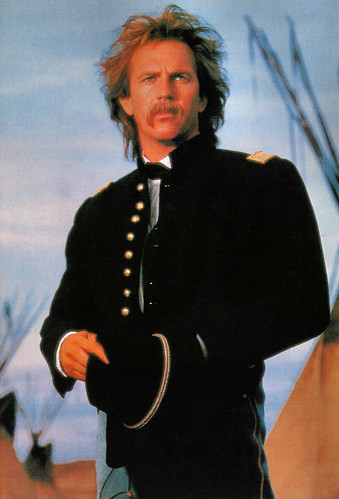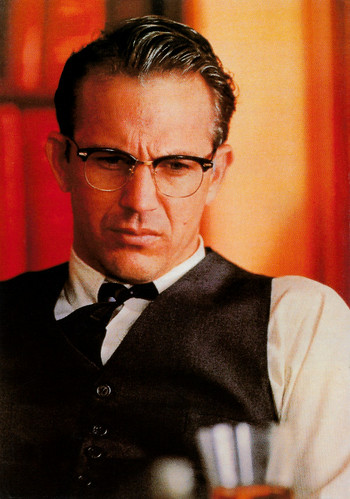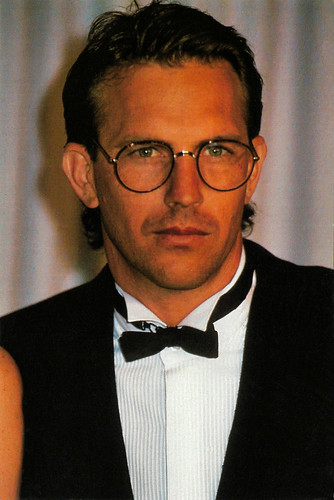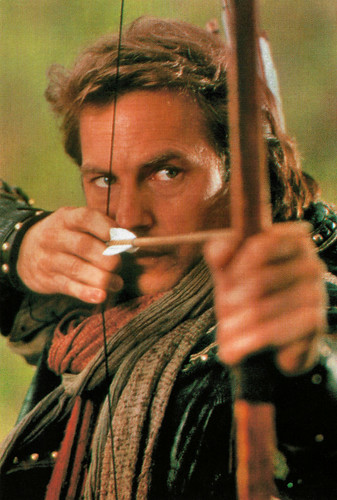
American postcard by Fotofolio, New York, no. GG13. Photo: Greg Gorman. Caption: Kevin Costner, Santa Barbara, 1988.

French postcard, no. 2056. Kevin Costner in Dances with Wolves (Kevin Costner, 1990).

Vintage postcard, no. 2036. Kevin Costner in Robin Hood - Prince of Thieves (Kevin Reynolds, 1991).
The first Western epic that Hollywood had seen in years
Kevin Costner was born in 1955, in Lynwood, California, and grew up in Compton. His mother, Sharon Rae (Tedrick), was a welfare worker, and his father, William Costner, was an electrician and, later, a utility executive at Southern California Edison. Kevin was not academically inclined in school. He enjoyed sports (especially football), took piano lessons, wrote poetry, and sang in the First Baptist Choir. While a marketing student at California State University in Fullerton, he became involved with community theatre. Upon graduation in 1978, he married Cindy Silva, who worked at Disneyland as Cinderella. Costner took a marketing job that lasted all of 30 days before he decided to take a crack at acting.
He took work that allowed him to develop his acting skills via tuition, including working on fishing boats, as a truck driver, and giving tours of stars' Hollywood homes to support the couple while he also attended auditions. He made an inauspicious film debut in the ultra-cheap independent film Sizzle Beach USA/Hot Malibu Summer (Richard Brander, 1986). AllMovie mentions 1974 as the premiere date. According to Wikipedia, it was filmed in the winter of 1978–1979, but the film was not released until 1981 and re-released in 1986 after Costner became a celebrity.
However, Costner decided to take a more serious approach to acting. Venturing down the usual theatre workshop, multiple-audition route, the actor impressed casting directors who weren't really certain of how to use him. That may be one reason why Costner's big-studio debut in Night Shift (Ron Howard, 1982) consisted of little more than background decoration, and the same year's Frances (Graeme Clifford, 1982) starring Jessica Lange, featured the hapless young actor as an off-stage voice. Director Lawrence Kasdan liked Costner enough to cast him in the important role of the suicide victim who motivated the plot of The Big Chill (Lawrence Kasdan, 1983). Unfortunately, his flashback scenes were edited out of the film, leaving all that was visible of the actor - who had turned down Matthew Broderick's role in WarGames (John Badham, 1983) to take the part - to be his dress suit, along with a fleeting glimpse of his hairline and hands as the undertaker prepared him for burial during the opening credits.
Two years later, a guilt-ridden Kasdan chose Costner for a major part as a hell-raising gunfighter in the 'retro' Western Silverado (Lawrence Kasdan, 1985), this time putting him in front of the camera for virtually the entire film. He also gained notice for the Diner-ish buddy road movie Fandango (Kevin Reynolds, 1985). The actor's big break came two years later as he burst onto the screen in two major films, No Way Out (Roger Donaldson, 1987) and The Untouchables (Brian De Palma, 1987); his growing popularity was further amplified with a brace of baseball films, released within months of one another. In Bull Durham (Ron Shelton, 1988), the actor was taciturn minor-league ballplayer Crash Davis, and in the following year's Field of Dreams (Phil Alden Robinson, 1989), he was Ray Kinsella, a farmer who constructs a baseball diamond in his Iowa cornfield at the repeated urging of a voice that intones "if you build it, he will come."
Riding high on the combined box-office success of these films, Costner was able to make his directing debut. With a small budget of 18 million dollars, he went off to the Black Hills of South Dakota to film the first Western epic that Hollywood had seen in years, a revisionist look at American Indian-white relationships titled Dances With Wolves (Kevin Costner, 1990). The supposedly doomed project, in addition to being one of 1990's biggest moneymakers, also took home a slew of Academy Awards, including statues for Best Picture and Best Director.

French postcard, no. A088. Kevin Costner in Dances with Wolves (Kevin Costner, 1990).

French postcard, no. A083. Sent by mail in 1994. Kevin Costner won two Oscars for Dances with Wolves (Kevin Costner, 1990).
A whopping amount of negative publicity
Kevin Costner's luck continued with the costume epic Robin Hood: Prince of Thieves (Kevin Reynolds, 1991). The film made money, though it seriously strained Costner's longtime friendship with director Reynolds. The same year, Costner had another hit - and critical success - on his hands with JFK (Oliver Stone, 1991). It examines the events leading to the assassination of United States President John F. Kennedy and the alleged cover-up through the eyes of former New Orleans district attorney Jim Garrison (Costner).
The next year's The Bodyguard (Mick Jackson, 1992), a romantic thriller written by Lawrence Kasdan, teamed Costner with Whitney Houston in her film debut. It follows a former Secret Service agent turned bodyguard who is hired to protect a music superstar from an unknown stalker. The film did so well at the box office that it seemed the actor could do no wrong. However, his next film, A Perfect World (Clint Eastwood, 1993), casting Costner against type as a half-psycho, half-benign prison escapee, was a major disappointment, even though Costner himself garnered some acclaim. Bad luck followed Perfect World in the form of another cast-against-type failure, the Western Wyatt Earp (Lawrence Kasdan, 1994).
Hal Erickson at AllMovie: "Adding insult to injury, Costner's 1995 epic sci-fi adventure Waterworld received a whopping amount of negative publicity before opening due to its ballooning budget and bloated schedule; ultimately, its decent box office total in no way offset its cost." The following year, Costner was able to rebound somewhat with the romantic comedy Tin Cup (Ron Shelton, 1996), opposite Rene Russo, and with Cheech Marin and Don Johnson in major supporting roles. The film was well-received by the critics and the public alike, and Costner received a nomination for the Golden Globe Award for Best Actor.
Unfortunately, he opted to follow up this success with another large-scale directorial effort, an epic adaptation of author David Brin's The Postman (Kevin Costner, 1997). It featured Costner as a Shakespeare-spouting drifter in a post-nuclear holocaust America whose efforts to reunite the country give him messianic qualities. Like Waterworld, The Postman received a critical drubbing and did poorly with audiences.
Costner's reputation, now at an all-time low, received some resuscitation with the romantic drama Message in a Bottle (Luis Mandoki, 1998), with Robin Wright, and later the same year he returned to the genre that loved him best with the baseball drama For Love of the Game (Sam Raimi, 1998). A thoughtful reflection on the Cuban missile crisis provided the groundwork for the mid-level success of the historical political thriller Thirteen Days (Roger Donaldson, 2000).

French postcard, no. 1023. Kevin Costner in Robin Hood - Prince of Thieves (Kevin Reynolds, 1991).

French postcard, no. 1308. Kevin Costner in JFK (Oliver Stone, 1991).

Dutch postcard by Boomerang. Photo: UIP. Kevin Costner in Waterworld (Kevin Costner, 1995). Caption: Beyond the horizon lies the secret to a new beginning.
Clark Kent's adoptive dad on Planet Earth
Kevin Costner played a member of a group of Elvis impersonating casino bandits in 3000 Miles to Graceland (Demian Lichtenstein, 2001) with Kurt Russell. This film drew harsh criticism, relegating it to a quick death at the box office. Costner's next effort was a more sentimental supernatural drama lamenting lost love, Dragonfly (Tom Shadyac, 2002). Hal Erickson at AllMovie: "Costner fared better in 2003, and returned to directing, with Open Range, a Western co-starring himself and the iconic Robert Duvall -- while it was no Dances With Wolves in terms of mainstream popularity, it certainly received more positive feedback than The Postman or Waterworld."
Next, Costner starred alongside Joan Allen in the drama The Upside of Anger (Mike Binder, 2004). It cast Allen as a single, upper-middle-class woman who unexpectedly strikes up a romance with the boozy ex-baseball star who lives next door (Costner). Even if divided on the picture as a whole, critics unanimously praised the lead performances by Costner and Allen.
After the thoroughly dispiriting quasi-sequel to The Graduate, Rumor Has It... (Rob Reiner, 2005), starring Jennifer Anniston, Costner teamed up with Fugitive director Andrew Davis for the moderately successful Coast Guard thriller The Guardian (Andrew Davies, 2006), co-starring Ashton Kutcher. Costner then undertook another change of pace with one of his first psychological thrillers, Mr. Brooks, (Bruce A. Evans, 2007). Playing a psychotic criminal spurred on to macabre acts by his homicidal alter ego (William Hurt), Costner emerged from the critical- and box-office failure fairly unscathed.
He came back swinging the following year with a starring role in the comedy Swing Vote (Joshua Michael Stern, 2008), playing a small-town slacker whose single vote is about to determine the outcome of a presidential election. Costner's usual everyman charm carried the movie, but soon he was back to his more sombre side, starring in the recession-era drama The Company Men (John Wells, 2010) alongside Ben Affleck, Chris Cooper, and Tommy Lee Jones.
As the 2010s rolled on, Costner's name appeared often in conjunction with the Quentin Tarantino film Django Unchained before filming, but scheduling conflicts would eventually prevent the actor from participating in the project. He instead signed on for the latest Superman reboot, playing Clark Kent's adoptive dad on Planet Earth in Man of Steel (Zack Snyder, 2013) starring Henry Cavill. In 2020, Kevin Costner returned to form with Let Him Go (Thomas Bezucha, 2020) with Diane Lane. They played a retired sheriff and his wife, grieving over the death of their son, set out to find their only grandson.

French postcard in the Postcard Collection, no. PC 115.

French postcard, no. A085. Kevin Costner in Robin Hood - Prince of Thieves (Kevin Reynolds, 1991).

British postcard by Oliver Books Ltd, London, no. 103.
Sources: Hal Erickson (AllMovie), Wikipedia, and IMDb.
No comments:
Post a Comment